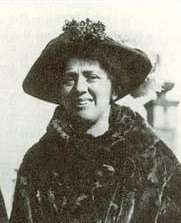Edith Ayrton
Edith Ayrton or Edith Ayrton Zangwill (1879 – 1945) was a British author and activist. She helped form the Jewish League for Woman Suffrage.
Edith Ayrton | |
|---|---|
 Edith Zangwill | |
| Born | 1879 Japan |
| Died | 1945 (aged 65–66) Edinburgh |
| Occupation | Writer |
| Nationality | British |
| Notable works | Barbarous Babe (1904) |
| Spouse | Israel Zangwill (m. 1903) |
Life
Ayrton was born in 1875 in Japan to the scientist William Edward Ayrton and the doctor Matilda Chaplin Ayrton. Her mother died in 1883 and her father married the physicist Hertha Ayrton. Ayrton was brought up in the Jewish faith. She married Israel Zangwill in a registry office in 1903.[1] They had met as a result of her step mother sending Edith's early stories to published writer Israel for his comments.[2] They had three children: Ayrton Israel Zangwill in 1906, a daughter Margaret in 1910 and Oliver Louis Zangwill in 1913[1] In 1904 she created her first novel, Barbarous Babe. Edith complained of poor health and she did not feel that she could be a militant suffragette but she and her step mother joined the Women's Social and Political Union. Edith wrote to Maud Arncliffe Sennett to tell her that she intended to generously support the WSPU. Her husband spoke publicly in support of the WSPU and was hissed by liberally minded women for his support of militant tactics.[2]
In 1912 she helped form the Jewish League for Woman Suffrage which was open to both male and female members. The organisation sought both political and religious rights for women. It was felt that some Jewish people may be more inclined to join this group in preference to an unspecific women's suffrage group. Other members included her husband, Henrietta Franklin, Hugh Franklin, Lily Montagu, Inez Bensusan[2] and Leonard Benjamin Franklin. Some more radical parts of the organisation were responsible for disrupting synagogue services to make their point in 1913 and 1914. The group was labelled as "blackguards in bonnets" by the wider Jewish community.[3]

The Jewish suffrage supporters came together on 6 February 1914 with other disillusioned suffragists to create the United Suffragists. The new group was created as a reaction tp the extreme militancy of the WSPU who had started a campaign of arson and the lack of success of the National Union of Women's Suffrage Societies. The new group included her stepmother, her husband, Emmeline Pethick-Lawrence, Maud Arncliffe Sennett and Louisa Garrett Anderson.[4]
Ayrton lived for many years in East Preston, West Sussex, in a house called Far End. She died in Edinburgh in 1945.[1][5]
Works
- Barbarous Babe (1904)
- The First Mrs Mollivar (1905)
- Teresa (1909)
- The Rise of a Star (1918)
- The Call (1924), which is similar to her stepmother's life
- The House (1928)
- The Story of the Disarmament Declaration (1932)[6]
References
- William Baker, "Zangwill, Israel (1864–1926)", Oxford Dictionary of National Biography, Oxford University Press, 2004; online edn, April 2016 accessed 6 November 2017
- "Edith Zangwill". Spartacus Educational. Retrieved 22 November 2017.
- "Jewish League for Woman Suffrage". Jewish Women's Archive. Retrieved 6 November 2017.
- "The United Suffragists". Spartacus Educational. Retrieved 6 November 2017.
- England & Wales, National Probate Calendar (Index of Wills and Administrations), 1858-1966, 1973-1995 for Edith Ayrton Zangwill; Calendar of the Grants of Probate and Letters of Administration made in the Probate Registries of the High Court of Justice in England 20 October 1945
- Zangwill, Edith Ayrton. The Story of the Disarmament Declaration. Amazon.co.uk. Retrieved 25 November 2017.